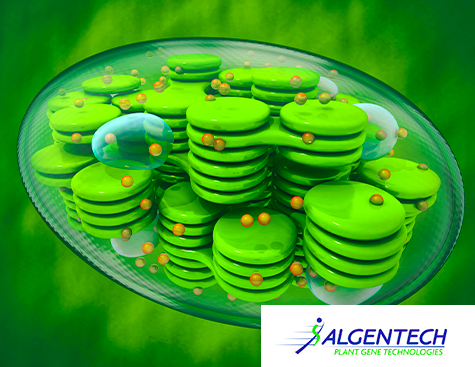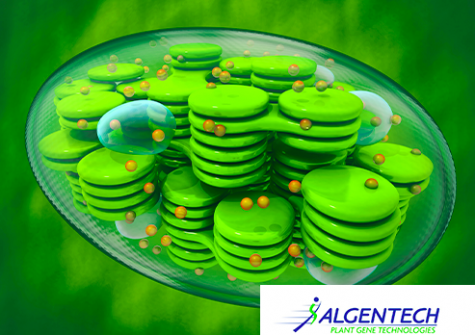Yesterday, the journal Nature Plants published an article on an unprecedented chloroplast-based molecular farming system developed and patented by Algentech. The article presents the company’s novel autonomous expression system wherein the gene of interest does not need to be integrated into the chloroplast genome. Instead, it is amplified as a “minichromosome,” an independent entity that yields expression rates for proteins or nucleic acids five to ten times those of genome-integrated genes of interest.
Plants—and potentially algae—transformed into green factories
Beyond its production yield, which can reach 70% of total soluble proteins, this new system also offers the possibility of transferring the integrality of biosynthesis pathways: there where current technologies are limited to the integration of several genes, the Algentech technology is able to express 15 to 20 genes simultaneously in plant cells. Algentech’s disruptive technology will become a tool of choice for synthetic biology and green chemistry applications, particularly the production of peptides, nucleic acids, enzymes, therapeutic compounds and other molecules of interest for such sectors as pharmaceuticals, cosmetics, food & agriculture, energy and more.
Algentech’s propriety technology can be compared to microorganism-based production systems but it has a notable advantage over them: by using chloroplasts, the organelles responsible for photosynthesis in plant cells, Algentech’s method uses sunlight as its energy source while consuming CO². The company’s technology turns plants into truly green factories, both sustainable and environmentally friendly. Tested in tobacco, soybean, carrot and duckweed, the system can be deployed in a plethora of land plant species and potentially in algae, which are also photosynthetic organisms with cellular chloroplasts.
Algentech: a bioproduction actor open to industrial partnerships
The company currently has several industrial and academic partnerships. Its platform will be used for the production of natural biopesticides for the agrochemistry industry and for the production of enzymes for the biofuels sector. Algentech is also seeking additional partnerships to extend its application reach and increase its production capacities. For example, the company’s technology holds promise for the biological production of squalene, an oil used in cosmetics and as an adjuvant in vaccines. It can also produce enzymes used in the production of biohydrogen, an energy with promise for the renewable energy transition.
 “With this technological breakthrough, Algentech has positioned itself as an actor in French bioproduction within a context of changing European industrial production policies that showed several shortcomings with the COVID-19 pandemic,” comments Algentech Executive Director and CSO Isabelle Malcuit. “Our technology addresses the need to strengthen and diversify France’s industrial capacities in a sustainable and environmentally friendly manner.”
“With this technological breakthrough, Algentech has positioned itself as an actor in French bioproduction within a context of changing European industrial production policies that showed several shortcomings with the COVID-19 pandemic,” comments Algentech Executive Director and CSO Isabelle Malcuit. “Our technology addresses the need to strengthen and diversify France’s industrial capacities in a sustainable and environmentally friendly manner.”

















